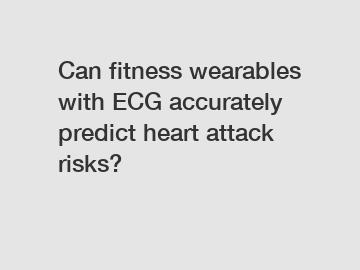Can fitness wearables with ECG accurately predict heart attack risks?
Fitness wearables have become increasingly popular over the past few years as people strive to monitor their health and track their fitness goals. These devices, which often come in the form of wristbands or chest straps, can provide valuable data on heart rate, calories burned, sleep patterns, and even stress levels. In recent years, some fitness wearables have also begun to incorporate an electrocardiogram (ECG) feature, which raises the question: can these devices accurately predict heart attack risks?
Before diving into this question, it's important to understand what an ECG is and how it works. An ECG is a diagnostic tool that measures the electrical activity of the heart. It records the rhythm and strength of the heart's electrical signals, which can help identify any irregularities or abnormalities.
One of the primary benefits of fitness wearables with ECG functionality is their ability to detect potential heart issues in real-time. By simply wearing the device on your wrist or chest, you can continuously monitor your heart's electrical activity and receive instant notifications if any irregularities are detected. This immediate feedback can potentially help individuals seek medical attention before a heart attack occurs.

However, it is crucial to note that while fitness wearables with ECG capabilities are becoming increasingly popular, they should not be considered a substitute for professional medical advice. These devices are not designed to diagnose heart conditions or predict heart attacks with certainty. Instead, they serve as an additional tool to raise awareness and provide users with insights into their heart health.
That being said, recent studies have shown promising results regarding the accuracy of fitness wearables with ECG in predicting heart attack risks. In one study published in the Journal of the American Medical Association, researchers found that these devices could accurately identify atrial fibrillation, a common heart rhythm disorder that increases the risk of stroke and other heart-related complications. The study concluded that fitness wearables with ECG have the potential to improve early detection and prevention of heart conditions.
Another study conducted by Stanford University focused on the Apple Watch's ECG feature specifically. The researchers found that the device could successfully detect atrial fibrillation, with a positive predictive value of 84%. This means that if the device identified an abnormal heart rhythm, there was an 84% chance that the user actually had atrial fibrillation. Although not perfect, these findings suggest that fitness wearables with ECG can indeed be valuable in assessing heart health.
In conclusion, while fitness wearables with ECG certainly show promise in predicting heart attack risks, they should not be solely relied upon for medical advice. Their importance lies in enhancing awareness and providing users with valuable insights into their heart health. If you have any concerns about your heart health or suspect any irregularities, it is always best to consult a healthcare professional who can provide a complete assessment. Fitness wearables should be seen as a tool for monitoring and raising awareness, rather than a replacement for medical guidance.
If you have any questions or want to learn more about fitness wearables with ECG, feel free to contact us. Our experts are here to provide you with the information and guidance you need to make informed decisions about your health.
For more smart sleep belt, smartwatch features and benefits, ecg smart fitness bandinformation, please contact us. We will provide professional answers.


